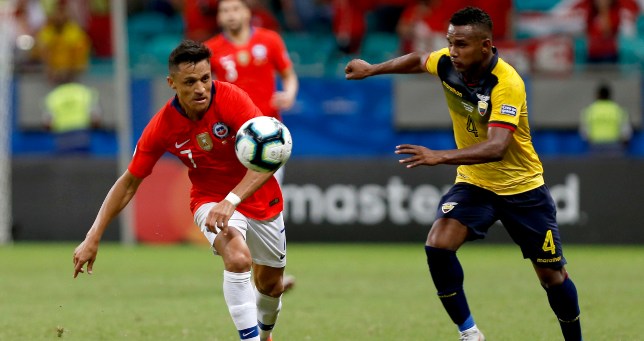
The forlorn Alexis Sanchez endured at Old Trafford has been utterly transformed back on South American soil.
A decisive side-footed volley in the weekend’s 2-1 triumph against Ecuador sent Chile into the knockouts with a game to spare and moved him onto two goals in two excellent Group C matches. This equalled the haul from 27, universally wretched, run-outs for his employers in 2018/19.
The 30-year-old is bedecked in a red shirt for both sides, yet the contrast couldn’t be starker.
A binary reaction to this upturn is obvious.
Either it points towards brighter days to come from the malfunctioning forward in 2019/20 at the Theatre of Dreams, or it’s a golden opportunity to place an unwanted figure in the shop window. Especially when the shedding of divisive wages worth approximately £500,000-a-week are involved.
Both points are pertinent. Both points, however, neglect important issues about United’s future.
Why were Sanchez’s struggles for the Red Devils predictable even at the time of his January 2018 addition in exchange for Henrikh Mkhitaryan, and why has the Copa brought out the best in him?
Until this issue is addressed, ruinous transfer market stumbles will continue.
Enlightening source material for reviled executive vice-chairman Ed Woodward, in the continued absence of his fabled first director of football hire, are quotes from Chile boss Reinaldo Rueda when pressed about the disparity in displays.
“He has the motivation, affection and some relationships that he has in the national team and maybe he didn’t have them in Manchester,” the 62-year-old told reporters.
“He arrived at a difficult, inopportune moment, perhaps in the most unbalanced United in recent years.”
Sanchez’s abject failure on club duty and exceptional output in the international arena is – seemingly – as much about environment, as it is ability.
He is far from alone at United. Midfielder Paul Pogba excelled when winning World Cup 2018 with France and wantaway striker Romelu Lukaku has netted 25 times in 22 Belgium fixtures since his £75 million purchase from Everton in July 2017.
This is not to absolve Sanchez of personal responsibility. Misfortune with repeat injury, especially ankle and hamstring issues, cannot outweigh the fact that one goal in his first 11 United fixtures upon arrival is scandalous compared to the heights witnessed at Arsenal.
Whatever the cause, he began nearly half of his United appearances last term on the substitutes’ bench for a reason.
For Chile, his last 28-consecutive caps have been earned as a starter. A run that stretches back to June 2017’s Confederations Cup, containing 12 goals.
Regular stationing on the left wing has remained a constant, for club and country.
How he is utilised and entrusted to perform, however, is night and day.
Illumination about why he shines for Chile and suffers for United is not hard to find.
At the Copa, mistakes are followed by “affection”. This support is key for a footballer characterised in media reports as a loner.
Sanchez is averaging – per match – 1.5 dribbles, two bad controls and three shots.
In the Premier League, alone, last term, these figures stand at: 0.7 dribbles, 1.1 bad controls and 0.9 shots.
A lack of regular starts cannot account for the cavernous gap between outputs for club and country.
This United, clearly, do not tolerate the successful philosophy of former IBM chairman Thomas John Watson Sr. that: “The fastest way to succeed is to double your failure rate.”
The tumult that Sanchez was thrown into is crucial.
Sanchez, at his best, is a lightning rod that randomly shoots out bolts of electricity. Constrain him and he short-circuits.
Arsene Wenger granted such space and 80 goals in 166 fixtures followed. The seasoned proving grounds of Udinese were similarly stimulating.
Adherence to the demanding ‘Cruyffism’ of Barcelona and deference to Lionel Messi led to mixed results. The pragmatism, to put it kindly, of Jose Mourinho at United accelerated a downwards spiral that replacement Ole Gunnar Solskjaer has been unable, or unwilling, to correct.
Sanchez is now the poster boy for the risk-averse culture that has permeated Old Trafford since the summer 2013 exit of the bold Sir Alex Ferguson. It does not only apply to the Chilean; its denaturing effects are mirrored in the struggles of Mkhitaryan, Paul Pogba, Angel Di Maria and several others.
Alluring artisans have been pursued by the administration at a time when foot soldiers, for better or worse, would have better fitted footballing requirements.
When club and player cannot offer what each needs to thrive, disappointment always follows.
For the very latest news, analysis and opinion download the Sport360 app